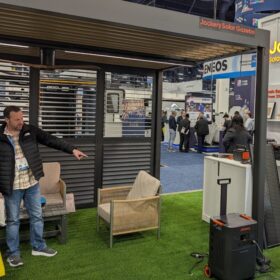Morning Brief: Nextracker CEO Dan Shugar on bifacial PV, plus NextEra’s massive energy storage plans
Also in this morning’s brief: Outback Power partners up for home resiliency, the top 10 global solar developers — plus NextEra is ready to construct Eagle Mountain, a 1,300 MW pumped storage project that is fully permitted and shovel-ready.
EnerVenue looks to shake up the battery market with metal hydrogen technology
The company launched today with $12 million in seed funding, boasting advantages over lithium-ion in performance, price, operability in extreme weather and decades of use in the aerospace industry.
In search of the ‘most rational design’ for anti-reflective coating
Scientists in Spain have tested various properties of anti-reflective and anti-soiling coatings for PV module glass, aiming to develop a material that offers the best balance of desired material properties at the lowest cost. Over a year of testing, the best coatings were shown to boost module output by around 2%, and the group also made several observations that could influence future developments of coatings for PV module front glass.
Avoiding blackouts all together with behind-the-meter storage
Commercial storage company Stem had 100 MW on tap during California’s rolling blackouts, but could only provide 50 MW due to limits on how much power its standalone installations can export.
Morning Brief: Elon Musk hints at yet another battery breakthrough, CAISO provides details on California blackouts
Also in the brief: A surge of nuclear outages in the U.S. this summer, Japan’s struggle to drive down renewables costs
Morning Brief: 5 GW of solar coming to Africa, the pressing need for panel recycling
Also in the brief: Pennsylvania has its first project using Commercial Property-Assessed Clean Energy financing, Gov. John Bel Edwards of Louisiana has signed two executive orders to reduce greenhouse gas emissions and enhance coastal resilience and more.
Twitter predicts the US Department of Energy Secretary in a Joe Biden administration
If Biden wins and if Twitter is accurate, the next DOE secretary will be…
Adding long-duration storage to the gas fleet lets the grid absorb more solar and avoid brownouts
Bill Conlon, founder of Pintail Power, believes hybridizing the existing gas turbine fleet with long-duration molten salt storage can help balance today’s complex grid and absorb more now-curtailed solar.
LS Power completes the world’s largest active battery storage system
It’s a title that is becoming more contentious by the day, but for the time being, LS Power’s 250 MW Gateway project in San Diego, California is the biggest battery in the world.
A closer look at JA Solar’s new 785/810 W panel series
According to the product sheet, the new series has dimensions of 2,219×1,765x40mm and weighs 43.5kg. Efficiency reportedly ranges from 20.1-20.8% and the module features a 12-year product warranty and 25-year linear power output guarantee.















